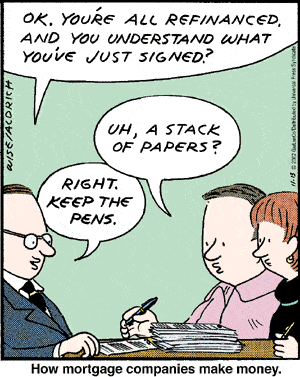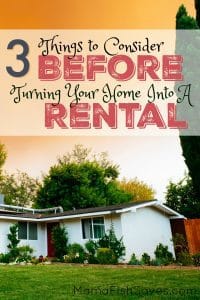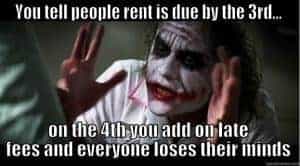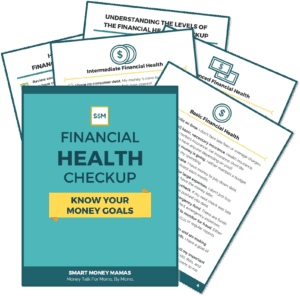You’ve outgrown your starter home and you’re ready to move your family to your forever home. But now you’re wondering if it is the best decision to sell your current property or keep it on as a rental asset. Maybe you can’t get the price that you want for it in the market today. Maybe you’ve just been reading about real estate investments and like the idea of an additional source of income. Whatever your reasons, there are three key questions you need to ask yourself before turning your home into a rental property.
Table of Contents
1 – Do You Want to Be a Landlord?
Alright, this may seem like an obvious place to start, but being a landlord is hard work! Lots of people who become landlords don’t give this enough thought before making the jump which causes unnecessary stress and frustration down the road. You are always at someone else’s beck and call, you have to find tenants and check in that they are maintaining the property, keep up with maintenance, and collect rent. Here are some things landlords report HATING about being a landlord:
- Tenants lying to them.
- Being the bad guy.
- “I’m sorry your kid needed a $600 epipen but I really still need you to pay your rent this month.”
- Finding good contractors and keeping them on time and on budget.
- This doesn’t even need a quote. Everyone who has ever owned a home knows this is horrible.
- Not good at DIY.
- The landlords that make the best investment returns are the ones who can do basic repair and maintenance themselves. If this isn’t you, your property is going to have higher expenses and more stress finding handymen on a short notice.
- Finding tenants.
- You usually have to screen through dozens of potential tenants to find the right choice for your property, and then hope they qualify and pick your home. Especially when the tenant search comes while your home is vacant, it can be very stressful covering two mortgages and not just turning your property over to questionable tenants.
- Never being off the clock.
- “Hi Mr. Landlord, I know it isn’t your set office hours, but hose behind the fridge burst and water is pouring all over the floor. What should we do?” Even in the times when these calls don’t come, you have to be ready for them to potentially come so you can’t fully relax.
What do experienced landlords say? Most experienced landlords would not recommend turning your home into a rental property. Tenants are very tough on properties and most single-family homes aren’t set up for the wear and tear. You need durable, easy to clean floors and countertops, easy to maintain landscaping, and paint and fixtures that are easy to clean/replace. Many would recommend selling your current home and using the equity to purchase a rental-friendly property or a modest fixer-upper where you could put the right materials. Otherwise, you could lose equity when you ultimately try to sell your lovely home because of renter damage.
But what about property managers? You could always hire a property manager to deal with most of the day-to-day renter problems for you. However, like every other kind of contractor, it can be very difficult to find a strong property manager that you trust and does things efficiently. Plus, on average, a property manager takes 10% of monthly rent and 50% of rent the first month a new tenant moves in as a fee. This drastically cuts into your return potential.
If you are totally fine with the potential workload of a landlord, move to question number two!
2 – Is the expected return on investment worth it?
The main reason families choose to convert their home into a rental property when they move is to take advantage of the home as an income property. Note that emphasis on income. The problem is, running an expected rent minus mortgage, taxes, and insurance calculation to determine your income potential misses many of the costs of owning a home.
Maintenance expenses on any home are estimated at 1.5%-2.0% of the home value, you could have additional costs for landscaping and snow removal, tenant turnover can lead to some amount of vacancy each year, and tenant acquisition and move in costs can run up to $2,000 per tenant.
CalcXML has an excellent free calculator for determining your expected investment return from turning your house into a rental property. You can include the details of your mortgage, what you expect to get for rent, expected expenses, and the amount of time you plan to hold the asset.
What investment return is worth it?
This is entirely up to you and your family. Maybe a +3% return is sufficient for your family as you don’t want to sell your current home and are looking to diversify your investments. Maybe you need a +10% investment return to make the headache of renting worth it. Whatever your number is, try not to massage the calculator to give you the number you want. Be conservative with your assumptions and see how the returns stack up. A chart from RealtyTrac shows the best and worst single family home rental rates in the US.
When I think about reasonable returns on an investment property, I always compare it to the returns I could get in a more liquid, passive (no work from me) investment. Over the very long term, adjusted for inflation, the stock market has grown 7.0% annually including dividends. There are REITS (Real Estate Investment Trusts) that pay +6% dividends annually. For me, unless returns were notably above those levels, owning an investment property wouldn’t be worth my time.
Does your home pass the returns test? On to question 3!
3 – Are you prepared for the personal financial costs of a rental?
Ideally, a rental property pays for itself through rent payments. You laugh your way all the way to the bank while a tenant pays down your mortgage and builds your equity in your property. However, you don’t always have a tenant. How long could your family last if you couldn’t find a tenant for your new investment property? How much does your family have set aside for major repair work – could you survive without going into debt if the heating system dies your first year with a tenant? Are you prepared to create an LLC or purchase personal umbrella insurance to protect your family and your other assets from tenant law suits?
Opening an LLC or purchasing umbrella insurance.
Signing contractual agreements with tenants and having tenants on your property opens you up to various
law suits, reasonable and frivolous. Someone could slip and fall or a declined tenant could sue for discrimination. In these cases, you don’t want the tenant to be able to come after your other investment and retirement savings, current home, or any other personal assets. Opening an LLC (limited liability corporation) will have an initial fee and possibly an annual fee (depends on your state and municipality), but transferring the home into the LLC prevents people suing the rental property from coming after you directly.
Another option, if you don’t want to create a new legal entity, is purchasing umbrella insurance. It adds liability coverage over your other insurance policies (home, auto) and helps protect you and your assets from major lawsuits. I would compare the cost of an LLC and an umbrella policy, and potentially talk to a real estate attorney about their recommendations for landlords in your area. Different tenant rights laws in different regions can impact the type of protection you might need.
Refinancing existing mortgage Into Investment Property.
To turn your home into a rental property, you may have to refinance your home loan. Sometimes the movement of a property into an LLC triggers the “Due on Sale” clause in your mortgage, meaning you have to pay it back or refinance. Sometimes the occupancy clause requires the home to stay your primary residence or be refinanced into an investment property mortgage. If you have a VA loan and want to use your VA loan for your next home, you will have to refinance into a civilian investment property mortgage. To determine if you need to refinance, you may need to speak to a real estate attorney about your specific mortgage.
Refinancing your mortgage can cost anywhere from $500-$3,000 in transaction and legal fees. In addition, interest rates on investment property mortgages are generally higher than primary residence mortgages, as the risk is greater for the bank. The higher interest rate and refinancing cost should be accounted for in your upfront expenses.
Securing a mortgage for your new home.
 A common question people have about turning their old home into a rental property, instead of selling, is whether they will qualify for a second mortgage. A mortgage bank will take into account 75% of your expected rent payments in your income when determining what you can afford for a second mortgage (assuming you are buying a new home when vacating your current one). This helps real estate investors carry more mortgage value than their regular income could normally support. But, let me shout something for you loud and clear. MORTGAGE BANKERS ARE NOT YOUR FRIENDS.
A common question people have about turning their old home into a rental property, instead of selling, is whether they will qualify for a second mortgage. A mortgage bank will take into account 75% of your expected rent payments in your income when determining what you can afford for a second mortgage (assuming you are buying a new home when vacating your current one). This helps real estate investors carry more mortgage value than their regular income could normally support. But, let me shout something for you loud and clear. MORTGAGE BANKERS ARE NOT YOUR FRIENDS.
A mortgage provider is there to tell you the maximum amount of debt they will let you take on, so they can get the highest amount of interest income from you. They don’t generally tell you the optimal amount of mortgage debt you should take on for your well-being or what could happen if the market turns or you have a major repair expense. Make sure you have sufficient emergency funds to handle tough times in your rental property or your new home.
So, are you ready to make the plunge and become a landlord?
Turning your primary residence into a rental property isn’t a straight forward process and isn’t one that should be made lightly. Being a landlord is hard, maintenance and miscellaneous costs could make the return on your investment unattractive, and upfront costs for the change may make the option difficult with the added expenses of moving yourself. But, if you’ve discussed these questions with yourself and your spouse, done the research and have decided you are prepared financially and mentally to take the plunge, you will now be able to do so with confidence! Good luck!
Have you turned a primary residence into a rental property? What about the process surprised you? What do you wish you would have known? Let us know!
Look out for our next post on the steps you will need to take to turn your current home into a rental property!






I’m going to have to go through this process once I decide what to do with my house right now. I’m renting out 2 rooms to friends and I’m single, so for now, I’m staying put.
The due on sale clause is a rough one. If I made it a rental property, I’d definitely put it into an llc. Ideally, this would happen in 3.5 years when my 5/1 ARM starts adjusting. Another thing I could do is just pay off the mortgage and that way I wouldn’t have to worry about a due on sale clause 🙂
Thanks for the post, very informative!!
How nice of your friends to rent out your rooms and pay your mortgage! 🙂 The due on sale clause isn’t always triggered with an LLC transfer, just something you have to watch out for. But paying of the mortgage would also make your returns on investment much higher!
Thanks for reading and for your thoughtful comments, as always!
We turned our primary residence into a rental after having to move for the military. It was not an ideal situation at all and not really a choice on our part. We had to go, and we needed some way to pay the mortgage after an early-occupancy fiasco left us in another state unable to sell the house at that time. I wish we had known the risk you take in being responsible for repairs as the landlord. Over the course of 2.5 years, we fixed a sink, a toilet, an HVAC system (twice), and replaced a garage door opener (the entire unit). The rent barely covered our mortgage and landlord insurance, so most of those repairs came out of our normal household funds. A very large emergency fund is essential if you are going to own a rental. Excellent advice.